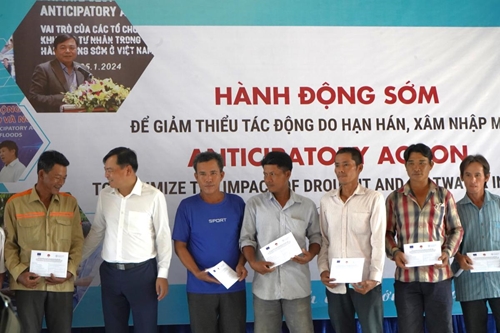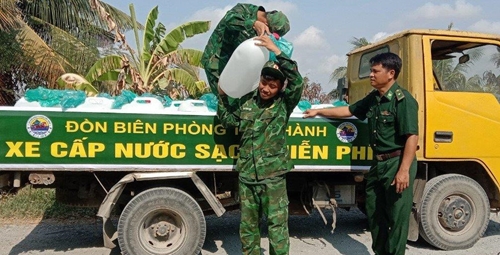Knowing about this situation, Vietnam’s natural disaster prevention partners have activated early action to help people stabilize their normal life. Meanwhile, border units have provided fresh water for people in areas affected by drought and saltwater intrusion.
Supporting people hit by drought and salinity
Due to the impact of El Nino, drought, and saltwater intrusion, most rivers, canals, and trenches in the Mekong Delta region have experienced the infiltration of saltwater. The prolonged drought and salinity have exerted negative effects on socio-economic development and people’s life, including subsidence on many traffic routes, shortages of water for people’s daily life and production activities, and people’s livelihoods have been turned upside down, among others.
    |
 |
|
Deputy Minister of Agriculture and Rural Development Nguyen Hoang Hiep hands over financial support to people hit by drought and salinity in Ca Mau. |
In Tien Giang province, since the mid-March, due to prolonged saltwater intrusion, people in seven communes and townlets in maritime border areas have lacked water for daily use.
Upon receiving the news, the Tien Giang provincial Border Guard Command directed border posts to take measures to help people hit by drought and salinity. Up to now, border units have called on benefactors and socio-political organizations to donate 1,400 cans of water and 400 barrels of filtered water, and transported more than 1,500 cubic meters of clean water to households.
Having three sides bordering the sea, Ca Mau is the only province among the 13 provinces in Mekong Delta which does not have additional supply of fresh water. According to Le Van Su, Vice Chairman of the Ca Mau provincial People’s Committee, the locality is witnessing severe drought. Ca Mau does not have additional supply of fresh water from large rivers, people’s daily life depends almost entirely on rainwater. Currently, nearly 16km of rural roads in the province have subsided, over 2,600 households are suffering from water scarcity, and over 35,500 hectares of forest are at fire risk from level III to level V, and others.
The province has mobilized many resources; proactively implemented a number of measures and early actions in response to drought and dealt with its consequences. However, this is a serious drought and the province is a big one with a large number of disadvantaged and vulnerable households. Therefore, the province cannot just rely on its internal strength deal with the situation.
In order to support people affected by drought and salinity, on April 9, the Ministry of Agriculture and Rural Development coordinated with the Food and Agriculture Organization of the United Nations (FAO) in Vietnam to activate early actions to help needy families in Ca Mau. More than 1,000 households with more than three members would receive financial support, worth VND 6 million, in two phases (April and May).
Early actions to protect people’s livelihoods
Since 2022, the Department of Dyke Management and Natural Disaster Prevention and Control has worked with FAO in Vietnam to implement the project titled “Strengthening capacity and expanding the scale of early action implementation along with connecting with the social protection system.”
The project has a specific goal to protect livelihoods and food security and ensure nutrition for vulnerable households in rural areas by predicting impacts of natural disasters, and providing humanitarian assistance; strengthening governance and pro-activeness in natural disaster risk reduction in Vietnam, including connecting and supporting the national social protection system. This will enhance the capability of vulnerable households in rural areas to withstand natural disasters and recover, while protecting the achievements of socio-economic development amid natural disasters.
    |
 |
|
Tien Giang border guards provide fresh water for people affected by drought and saltwater intrusion. |
The project has been implemented in several coastal provinces in Central region and Mekong Delta. In particular, the management board of the project successfully organized a forecast-based early action exercise in Quang Tri and Quang Nam provinces; activated early actions to support 600 households in Quang Tri and Thua Thien Hue province before Storm Noru in 2022; gave financial support, valued at VND 1.8 million each, to 731 households in seven communes in Thua Thien Hue before the flood in November 2023; to name but a few.
Additionally, the project has studied the integration of forecast-based early actions into natural disaster prevention plans at all levels and the possibility of connecting early action with the social protection system; tested the construction of camps to evacuate livestock during the flood in some localities in the Central region; and supported the building of Ha Long Declaration on strengthening early action in ASEAN disaster management.
Source: baobienphong
Translated by Quynh Oanh